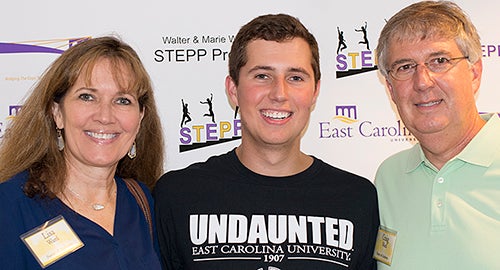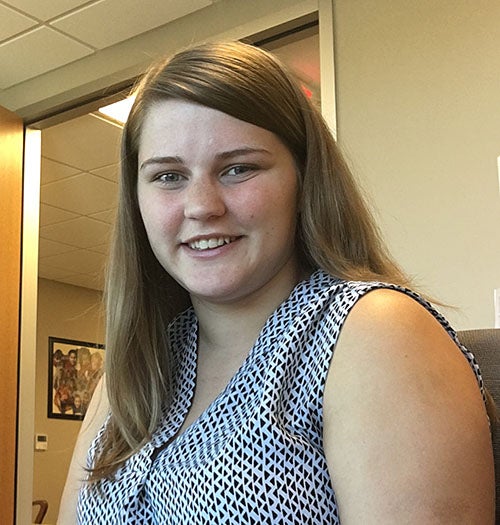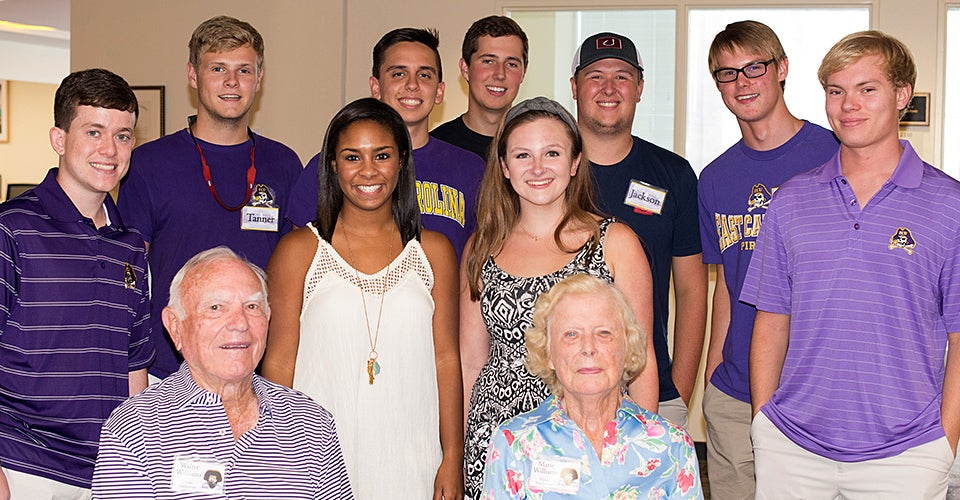STEPPING UP
Unique program gives students an opportunity
As of May 2016
• 81% of STEPP students graduated or are on track to graduate
-another 8% transferred to another institution and made or are making progress
• 45% of currently enrolled STEPP students with GPAs at or above 3.0
• 76% of currently enrolled STEPP students with GPAs at or above 2.5
• All STEPP students are in good academic standing
• Majors range from chemistry and engineering to fashion merchandising and graphic arts
Gabrielle Robinson is a driven student. The Charlotte native has had to work harder than most to get to college. While Gabrielle is intelligent and capable of academic excellence, her auditory processing disorder causes her to learn differently from the typical student.
“Usually I have to record things, just to have it repeated so that I can fully understand it,” she said.
Robinson’s determination has her succeeding in college at East Carolina University thanks in part to the Supporting Transition and Education through Planning and Partnerships or STEPP Program, which gives students with an identified learning disability a chance to go to college.
About 10 students are accepted each year, and ECU starts working with them during their senior year in high school. First-year ECU STEPP students arrive a week before their first classes begin to take part in a special boot camp that gets them ready for college. While at ECU the students work closely with STEPP faculty and staff.
“It’s an answer to our prayers; it truly is,” said Lisa Ward, whose son, Andersen, is dyslexic. Ward said Andersen tried private school, public school and she even tried home schooling him. During his junior year of high school Ward said Andersen wanted to give up, that he just couldn’t take the struggle of school anymore. Then, she said, they found out about the STEPP Program at ECU.

Andersen Ward (middle) poses with his mother, Lisa, and father, Craig, during the STEPP Program’s red carpet welcome dinner.
“When I first heard about it, I wanted nothing of it,” Andersen Ward said. “I thought I could do it myself, then I had the realization I couldn’t go to college doing this by myself and expect to get good grades. I needed something like this to actually succeed and know what I’m doing.”
Just like Robinson, Andersen Ward is now a freshman at East Carolina, where they are two of nine new students in the STEPP Program. This is the program’s 10th year and the cohort includes the 100th STEPP student to be admitted to ECU.
“Honestly, I don’t think I would have gotten into school anywhere without the STEPP Program,” said former STEPP student and 2014 ECU graduate Lee Olson.
Because of her learning disability, Olson said she struggled with reading and writing. Her high school grades were fine but she didn’t score well on the SAT. The STEPP Program took all that into consideration when accepting her.

Lee Olson is a former STEPP student and is a 2014 graduate of ECU. She now works with abused and neglected children.
“I think it gave me a place where I felt comfortable to go and ask questions and be there as long as I needed to be,” Olson said.
She now works with abused and neglected children in Wilmington.
Dr. Sarah Williams, director of STEPP, doesn’t know of any other program like ECU’s in the country. While there are other schools that accept and cater to those with learning disabilities, she said the STEPP Program is unique in that the university offers a comprehensive approach to serve students without it costing extra for those students to receive that support.
“We wanted this to be accessible to students who have the capacity to earn a college degree but would need some extra support and may not have the money to pay for extensive extra support services,” Williams said.
The STEPP Program got off the ground with a donation from Walter and Marie Williams. Their grandson has a learning disability and went through the program as well.
“We believe in the staff. The staff is so important – they care,” Walter Williams said.
Currently the STEPP Program is partially funded by a five-year grant from the Oak Foundation. The family foundation is based in Geneva, Switzerland and has an office in Chapel Hill. As part of its Learning Differences Programme it trains teachers, mentors children and supports the development of technology to help them learn. Because of this, Oak Foundation program officer Dana Brinson said the foundation wanted to be a part of the STEPP Program.
“It’s not feasible for a lot of people to pay for this level of support in addition to what college is costing these days,” Brinson said. “One of the key components that we really appreciate about STEPP was that this was provided at no additional cost to the students and their families.”
But in order to keep STEPP free for students, the program is going to have to build a $4 million endowment to sustain it. They have raised $1.5 million so far.
“It’s absolutely critical, I mean if we stick to our mission of providing high quality support for these students … we’re going to have to build that endowment,” Dr. Williams said.
For students and families like the Robinsons, Wards and Olsons, the STEPP Program is a life changer.
“He’s going to get a degree,” Lisa Ward said, smiling from ear to ear.

The newest STEPP cohort poses for a picture with donors Walter and Marie Williams. (Contributed photos by College STAR)